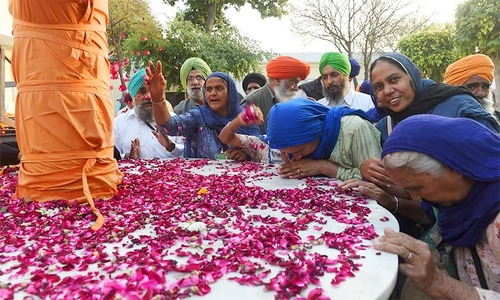ISLAMABAD: Experts from Pakistan and India held a meeting on Tuesday to discuss the alignment of the Kartarpur border-crossing corridor project, set to be opened for Sikh pilgrims this year.
“The meeting was held in a positive and constructive environment,” said an official statement issued by the Foreign Office, with both sides jointly surveying the coordinates of the zero point and discussing technical aspects (including finished road level, high flood level, etc).
The two sides agreed on some technical aspects and hope to finalise other modalities soon. The next meeting is to be held at Wagah on April 2.
Last week, Islamabad and New Delhi agreed to expedite the opening of the project to facilitate Sikh pilgrims in visiting holy sites on both sides of the border. During the last meeting at Attari, the two sides had agreed to hold the next meeting at Wagah on April 2, to be preceded by a meeting of technical experts on March 19, at the proposed zero line. At the time, Foreign Office spokesperson Mohammad Faisal, who led the Pakistani delegation, said that the decision to hold the meeting with the Indian side was in line with Pakistan’s sincere efforts to de-escalate the situation for regional peace and stability, whilst expressing the hope that Prime Minister Imran Khan’s initiative would not only facilitate Sikhs, especially from India, but in the current vitiated situation this could be a step in the right direction from conflict to cooperation.
In Pakistan, the groundbreaking ceremony of the corridor was performed on Nov 28 last year. Fifty per cent of the four-kilometre stretch being built by Pakistan has been completed while the stretch between the zero line to Baba Nanak’s shrine is being built by India. New Delhi is also building a passenger terminal at an estimated cost of Rs1.9billion.
In January, Pakistan shared its draft of the relevant accord with India and invited its delegation for a visit for negotiating the document, which hopes to govern operations of the route meant to provide visa-free access to Indian Sikh pilgrims to the gurdwara in Kartarpur Sahib (Narowal district).
However, India insisted on hosting the meeting and asked Pakistani officials to visit New Delhi either on Feb 26 or March 7. Although counter-proposals from the two capitals had given the impression of a sort of standoff on the issue, Islamabad vowed to “take the process forward.” In addition to official-level talks, India also proposed technical discussions.
China has welcomed the meeting. During a press briefing in Beijing, Chinese Foreign Ministry spokesperson Geng Shuang expressed the hope that progress on the matter would help further ease tensions between India and Pakistan and improve the regional situation.
Cabinet decision
New Delhi has asked Islamabad to allow 5,000 Sikh pilgrims to visit Kartarpur every day but initially, Pakistan will provide the facility to 500 pilgrims per day.
“The number will be increased gradually,” said Information Minister Fawad Chaudhry in a press conference on Tuesday, whilst giving details of the federal cabinet meeting chaired by PM Khan.
Providing details, he said that the full project was spread over 1,500 acres of land, including a 6.8km road from India to Pakistan and an 800 meter bridge on the River Ravi. He added that Sikh leader Navjot Singh Sidhu had written a letter to the Pakistan government demanding that no construction should be conducted on any land that his community’s spiritual leader Baba Guru Nanak used to cultivate. “In view of this demand, we have decided not to construct on the 30 acres of land that Baba Guru Nanak used for agricultural purposes,” Mr Chaudhry added.
Published in Dawn, March 20th, 2019















































